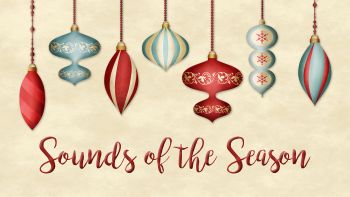Sounds of the Season 12•18•2022
It’s the Most Wonderful Time of the Year | Edward Pola and George Wyle (arr. Chris Sharp)
“It’s the Most Wonderful Time of the Year” is a popular Christmas song written in 1963 by Edward Pola (1907–1995) and George Wyle (1916–2003). It was recorded and released that year by pop singer Andy Williams for his first Christmas album. The song is a celebration and description of activities associated with the Christmas season, focusing primarily on get-togethers between friends and families. Among the activities included in the song is the telling of “scary ghost stories,” a Victorian Christmas tradition that has mostly fallen into disuse but survives in the seasonal popularity of numerous adaptations of Charles Dickens’ A Christmas Carol. Other activities mentioned include hosting parties, spontaneous visits from friends, universal social gaiety, spending time with loved ones, sledding for children, roasting marshmallows, sharing stories about previous Christmases, and singing Christmas carols in winter weather.
The Polar Express | Alan Silvestri and Glen Ballard (arr. Jerry Brubaker)
This arrangement features songs from the score of the 2004 film The Polar Express, based on Chris Van Allsburg’s award-winning children’s book. The music from the film, composed by Alan Silvestri (b. 1950) and Glen Ballard (b. 1953), won the 2006 Grammy for best song written for a motion picture and was nominated in that category for both an Oscar and a Golden Globe. Original songs from the score include “Believe,” “Hot Chocolate,” and the title track, “The Polar Express.” Composer and arranger Jerry Brubaker (b. 1946) has published more than 200 works for band, chorus, and orchestra. He is well known for his patriotic compositions and arrangements of popular music.
Christmastime Is Here | Vince Guaraldi (arr. Stan Bann)
Vince Guaraldi (1928–1976), a jazz pianist and composer, wrote the musical scores for all 16 Peanuts television specials. The first song Guaraldi wrote for the Peanuts series was “Linus and Lucy,” which later became the signature theme of all the specials. Guaraldi composed “Christmas Time Is Here” in 1965 for A Charlie Brown Christmas. This arrangement of the modern Christmas classic is by Medalist member Stan Bann.
The Holly and the Ivy | Traditional (arr. Stan Bann)
“The Holly and the Ivy” is a traditional British folk Christmas carol. The song can be traced only as far as the early nineteenth century, but the lyrics reflect an association between holly and Christmas dating at least as far as medieval times. Holly, especially the variety found in Europe, is commonly referenced at Christmas time. Since medieval times the plant has carried a wealth of Christian symbolism. The sharpness of the leaves help to recall the crown of thorns worn by Jesus; the red berries serve as a reminder of the drops of blood that were shed for salvation. Combined with the fact that holly maintains its bright colors during the Christmas season, it naturally came to be associated with the Christian holiday. This unique arrangement is by Medalist member Stan Bann.
The First Noel | Traditional (arr. Julie Giroux)
“The First Noel” tells the story of the birth of Jesus. The melody is thought to have originated in France during the 1500s; the French word noel means “birthday.” During the early 1800s, the carol was likely brought to England by wandering troubadours. The English form, nowell, was traditionally sung on Christmas Eve, when villagers gathered to celebrate the bringing in of the Yule log. During this time, carols were thought of as popular religious songs and sung outside church. Julie Giroux (b. 1961) has written more than 100 television and film scores, as well as numerous works for symphonic orchestras, wind ensembles, and chamber groups. Her arrangement of “The First Noel” was published in 2011.
The Night Before Christmas | Randol Alan Bass
The poem “A Visit from St. Nicholas,” more commonly known as “The Night Before Christmas,” is attributed to Clement Clarke Moore (1779–1863). The verse was first published anonymously on December 22, 1823, in the Troy, New York, newspaper, and it was reprinted for several years before Moore claimed authorship. Moore’s verse—one of the most popular of all American poems—is considered the origin of the modern notion of Santa Claus. This musical version of the poem, by Randol Alan Bass (b. 1953), was commissioned in 1988 by the Cleveland Symphony.
Tom Hegg, Narrator
Intermission
Sleepers, Awake! | J. S. Bach (arr. Alfred Reed)
Johann Sebastian Bach (1685–1750) based the text and music for “Sleepers, Awake!” on a Lutheran chorale. He composed two versions: a cantata in 1731 and an organ prelude in 1746. The hymn became well known among U.S. audiences after it was recorded by the Philadelphia Orchestra under the direction of Eugene Ormandy. The poignant work was arranged for concert band by Alfred Reed (1921–2005), one of the United States’ most prolific composers and arrangers.
There Shall a Star | Felix Mendelssohn (trans. Mark J. Chelgren)
From Felix Mendelssohn’s (1808–1847) unfinished oratorio Christus, this chorus is from one of Mendelssohn’s final works, which was tragically cut short by Mendelssohn’s early death at the age of 38. He had apparently planned to write the entire oratorio following the same trajectory as Handel’s Messiah but left only a few finished sections and several fragments. Medalist member Mark Chelgren transcribed this beautiful chorus for concert band.
The Christmas Song | Mel Tormé and Robert Wells (arr. John Cacavas)
A holiday favorite, “The Christmas Song” was composed in 1944 in a collaboration between Mel Tormé (1925–1999) and Robert Wells (1922–1998). The duo reportedly wrote the piece in just 40 minutes on a sweltering summer day. Wells, best known as a lyricist, thought that he would “stay cool by thinking cool.” “The Christmas Song” is one of the most often performed holiday pieces; it has been recorded more than 1,700 times.
White Christmas | Irving Berlin (arr. Zane Van Auken)
Several stories are told about how Irving Berlin (1888–1989) came to write “White Christmas,” a nostalgic tune that reminisces about an old-fashioned Christmas. According to one of the tales, Berlin wrote the piece in 1940 while sitting poolside at the Biltmore Hotel in Phoenix, Arizona. “White Christmas” was introduced in the 1942 film Holiday Inn and won the Oscar for best song that year. Today, the piece is considered the most often performed of all holiday songs.
Minor Alterations: Christmas Through the Looking Glass | David Lovrien
Composer David Lovrien (b. 1963) morphs more than eight favorite holiday tunes, from “Deck the Halls” to The Nutcracker Suite, into something new and inventive—a little darker than most holiday music, perhaps, but still familiar and full of wonder. By transposing the tunes from major keys to minor keys, changing styles, and overlapping melodies, Lovrien gives each carol a completely new character. Alternately dramatic and funny, wistful and energetic, this medley is full of musical surprises.
Have Yourself a Merry Little Christmas | Hugh Martin and Ralph Blane (arr. Douglas E. Wagner)
Judy Garland introduced this song in the 1944 musical film Meet Me in St. Louis during a melancholy scene set on Christmas Eve. Songwriting duo Hugh Martin (1914–2011) and Ralph Blane (1914–1995) composed all the songs for the hit musical, which was later adapted into a Broadway play. In the original lyrics, Martin focused on looking ahead to a better future, but before filming of the movie began, he was asked to change some of the words to make the song more upbeat. Garland’s recording of the song became popular among U.S. troops serving in World War II.
Greg Wyman, Flugelhorn
Sleigh Ride | Leroy Anderson
This holiday tune by Leroy Anderson (1908–1975) is perhaps his most well known. The idea for the composition came to Anderson during a heat wave in 1947, and he completed the piece in February 1948. A year later, Arthur Fiedler and the Boston Pops Orchestra first recorded the orchestral version, and it became an immediate hit. ASCAP reports that “Sleigh Ride” consistently makes the top-10 list of most-performed music worldwide during the Christmas season.
Program notes by Sue Freese and Sue Hinton
Upcoming Performances
Join our mailing list
Subscribe to our email newsletter to learn about upcoming concerts.


